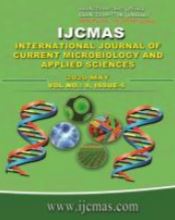


 National Academy of Agricultural Sciences (NAAS)
National Academy of Agricultural Sciences (NAAS)

|
PRINT ISSN : 2319-7692
Online ISSN : 2319-7706 Issues : 12 per year Publisher : Excellent Publishers Email : editorijcmas@gmail.com / submit@ijcmas.com Editor-in-chief: Dr.M.Prakash Index Copernicus ICV 2018: 95.39 NAAS RATING 2020: 5.38 |
Rice is an important food crop extensively grown in India. Several factors are responsible for reducing the rice productivity in worldwide. However, weed infestation is the major biotic threat to productivity of transplanted rice. Weeds are competed with rice by their high adaptability and faster growth, dominate the crop habitat and reduce the yield potential of rice. Weed management is an important agro-technique for successful transplanted rice cultivation. It can be achieved, either manual or mechanical or chemical weed control methods. Even though, hand weeding is an effective method of weed management, scarcity of labour and cost of weeding force the farmers to depend on chemical weed management. Herbicides offer the most effective, economical and practical way of weed management. Weed infestation before puddling may cause severe crop weed competition during early growth stage of rice by their re-emergence. Foliage active pre plant herbicides viz., glyphosate, glufosinate ammonium and halosulfuron methyl could be used effectively to control weeds before transplanting rice. As these herbicides would not have much soil activity, succeeding transplanted rice will not be affected. Controlling of emerged weeds leads exhaustion of weed seeds in the top soil and also the problematic weed like Cyperus would considerably reduce the weed population in the transplanted rice during early stages resulted in less crop weed competition and better growth and yield of rice. Few studies indicated that application of glyphosate 2.5 kg ha-1 at 15 days before puddling found significantly reduced the weed density in transplanted rice. Similarly, glufosinate ammonium 1.0 kg ha-1 as pre plant herbicide controlled the weeds effectively which resulted in lesser weed competition in transplanted rice. Thus, pre plant application (PPA) of glyphosate 2.5 kg ha-1 or glufosinate ammonium 1.0 kg ha-1 at 15 days before puddling recommended for effective weed control as well as higher productivity and profitability of transplanted rice.
 |
 |
 |
 |
 |